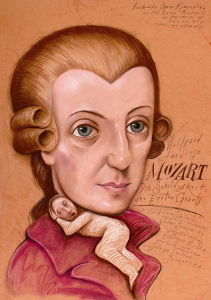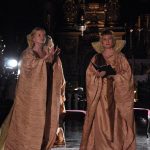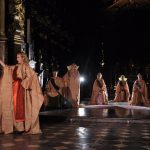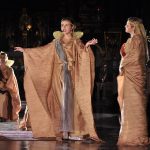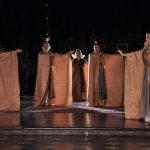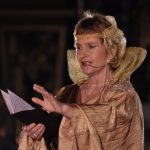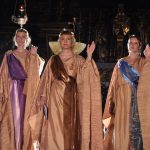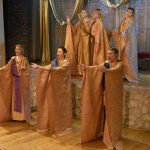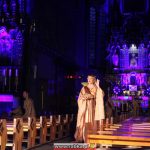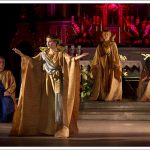Credits
Staged, directed by: Wacław Jankowski
Musical direction: Michał Łukasz Niżyński
Set design, costumes: Katarzyna Mucha
Stage movement composition: Jadwiga Leśniak – Jankowska
Gerechtigkeit, Barmherzigkeit (Justice, Mercy): Jadwiga Leśniak – Jankowska
Weltgeist (Spirit of the World): Anna Bugajska
Christgeist (Christian Spirit): Martyna Malcharek
Gerechtigkeit (Justice): Magdalena Rucińska (soprano)
Barmherzigkeit (Mercy): Anna Stolarczyk (soprano)
Weltgeist (Spirit of the World): Joanna Szynkowska vel Sęk (soprano) / Agnieszka Kozłowska (soprano)
Christgeist (Christian Spirit): Maciej Gallas (tenor)
Christ (Christian): Paul Fundament (tenor)
The Krakow Chamber Opera Orchestra:
I Violin: Dominika Olszewska
II Violin: Karolina Bartczyszyn / Barbara Szpakiewicz
I Viola: Karolina Stasiowska / Małgorzata Dawid
II Viola: Natalia Miszczyk / Aleksander Frankiewicz
Cello: Karolina Kalinowska
Double bass: Lesław Wydrzyński
Flute: Ewa Tupik Oboe: Izabela Berdy
I Bassoon: Wiktor Krzak
II Bassoon: Jan Michalski
Spinet: Anna Huszczo
Photos
Premiere on August 14, 2009, Corpus Christi Basilica in Krakow
fot. Paweł Zechenter
November 28, 2009, Krakow Chamber Opera
fot. Paweł Zechenter
Lesser Poland Premiere, August 15, 2010, Church of st. Mary Magdalene in Rabka
fot. Piotr Kuczaj
August 28, 2011, All Saints Church, Dąbrowa Tarnowska. Festival “Music enchanted in wood – on the trail of wooden architecture in Lesser Poland”
z arch.MOT
Reviews
‘Le menzogne di falsi dei’ – The lies of false gods
The First Commandment: ‘I am the Lord, Thy God. Thou shalt have no other gods before me’. The main theme seems to be the reprobation of idolatry. The false gods – power, striving for success and fame, money – lead man away from indomitable faith in God, which truly frees man from any bondage. The artists of Krakow Chamber Opera demonstrated high artistic skill in Mozart’s singspiel – the singers were Magdalena Rucińska (Divine Justice), Anna Stolarczyk (Divine Mercy), Anna Filimowska (Worldliness) and Maciej Gallas (Spirit of Christianity). Musical ensemble was finely conducted by Zbigniew Graca. The director Wacław Jankowski has concentrated on the duality of the characters: on the one hand we had singers performing the original libretto, on the other actors performing in Polish. Those counterparts were reiterating the most important fragments of the allegorical dispute between forces of nature and spirit, so as to reinforce the overall message. The intriguing choreography by Jadwiga Leśniak-Jankowska had elements of Baroque churches as its background and was adorned by the refined costumes sewn by Katarzyna Mucha. This rarely staged piece is a real treasure. It is definitely worth seeing.
Gabriella Buzzi
L’opera
Issue 248, June 2010
* * * * * * * *
The First Commandment: Gracefullness
‘You don’t know it? Go on and listen then!” – that could be the motto of Krakow Chamber Opera, which consistently stages the lesser known or virtually unknown works. ‘In our opera house the stage, the orchestra pit and the audience are all situated at one level, because, after all, theatre is created by the viewers as much as by the performers’ – says director Wacław Jankowski. Such was the November premiere which inaugurated the sixth artistic season in Chamber Opera; ‘Die Schuldigkeit des ersten Gebots – The Obligation of the First and Foremost Commandment’ by Wolfgang Amadeus Mozart. It is the first dramatic work by the composer, written when he was a mere 11-year old boy. Described as opera sacra or religious singspiel, it is a morality play, a very popular genre in the Baroque period, in the form of an oratory. It was commissioned by the archbishop of Salzburg, prince Sigismund von Schrattenbach. The play has been created in 1767, after Mozart’s return from the European tournée, and staged in the archbishop’s palace. Mozart composed the first part of the singspiel (overture and eight pieces), the two remaining parts were composed by Michael Haydn and Anton Cajetan Adlgasser. The archbishop rewarded the little boy with a golden medal in praise of his technical prowess and sense of voice. The singspiel does not yet promise though the future genius of the musical theatre. It is an obligatory lesson from the old classic counterpoint, which the boy Mozart studied for nine months. The learning methods included listening to the church organ at Salzburg cathedral and copying the works of Johann Ernst Eberlin between French, English and Italian lessons. Libretto by Ignaz Anton von Weiser alludes to the First Commandment: „Thou shalt have no other gods before me”and is a typical morality play. The allegorical figures – Divine Justice, Divine Mercy and Worldliness – are trying to draw the Christian to their side while battling for his Soul (Christian and his Soul being two separate characters). Justice and Mercy point out the values of the godly things, all while offering only ‘stick’, i.e. fear and punishment. Worldliness, on the other hand, praises the earthly life and tempts Christian with a ‘juicy carrot’. The two Virtues are trying to scare Christian with the visions of hellish abysses and Judgement Day, when he will need to give an account of his indolent life before God. They also try to persuade him to hard work, dilligence and dutifulness. Worldliness asks rhetorically in response: did not the Creator give us the Earth to enjoy and please ourselves? It is a wicked question, but it incites a fiery debate, both dramatically and musically. The Christian is at the crossroads: he would like to be a God-fearing man, but on the other hand such cold, hard truth is not to his liking. Unfortunately, we will never know which path he eventually chooses as the parts written by Haydn and Adlgasser have gone missing. Let ust hen restrain our judgement and leave him to the will of the Almighty, just as Justice and Mercy would have it.
The spectacle directed by Wacław Jankowski has been the Krakow premiere – the singspiel has been previously staged on the boards of Warsaw Chamber Opera in 1990. It is performed in the same vein as all the other chamber spectacles, only somewhat more subdued – the director did not forget that it is in fact an oratory rather than an opera. The characters of the play have two different versions: there are the opera singers performing in Italian and there are also actors who recite the same lines in Polish. The scenic movement, arranged by Jadwiga Leśniak-Jankowska, is symbolic rather than realistic as befits this particular genre. Choreography subtly reinforces the character of arias and recitatives, while the shifts between actors and singers are smooth. Those changes on stage emphasise the conventionality of action and its unusual qualities – it plays out between the real and the dream, both literal (Christian’s dream) and metaphorical (life of sin is a dream). The costumes and scenography by Katarzyna Mucha refer to the symbolism of judgement (here specifically the judgement of Christian). Three allegorical figures are seated on thrones, while all characters wear golden, toga-like robes and matching headbands. The only difference is the color of sashes, which can be explained by the Polish judicial tradition, where a certain colour of ruffle is ascribed to each profession: purple worn by judge (Divine Justice), red worn by prosecutor (Worldliness) and blue worn by counsellor (Divine Mercy). Another value of the spectacle is the universal, timeless dimension it has been given – it is actually a Man, not necessarily a Christian one, who is faced with the moral dillemas. The music of young Mozart does not require any deeper interpretation from the singers, though it does require technical prowess. The performers lived up to the expectations, although at varied level. In my opinion, the female singers – Magdalena Rucińska (Divine Justice), Anna Stolarczyk (Divine Mercy) and Anna Filimowska (Worldlinesss) – delivered a superior performance. All of them are young, good-looking sopranos with strong voices and excellent technique. Rucińska, a coloratura soprano, did an excellent job with all the fiorituras. Stolarczyk, who was given the most challenging, virtuoso aria, ‘Ein ergrimmter Lowe brullet’, impressed not only with her rippling timbre and intonation, but also powerful expression. Finally, Filimowska won me over with her coquetish charm and energy. As regards the tenors, Paweł Fundament (Christian) in my view performed much better than Maciaj Gallas (Christian Soul), who sang his part properly, but his voice lacked some brilliance. The acting roles were successfully performed by Jadwiga Leśniak-Jankowska (Divine Justice, Divine Mercy), Anna Bugajska (Worldliness) and Martyna Malcharek (Christian Soul). The musical ensemble of Krakow Chamber Opera, conducted by Zbigniew Graca, performed in style – special mention must be given to the solo part of alto trombone by Rafał Krauze in Christian’s aria.
‘Die Schuldigkeit des Ersten Gebots’ has been staged first in Corpus Christi basilica on the 14th of August, as a part of the festival ‘Night of the Churches – Cracovia Sacra’. It was followed by the official Krakow premiere, which coincided with the fifth anniversary of the Krakow Chamber Opera. It was a fitting occasion to honor its founders – they received silver medals ‘On the occasion of the 750th anniversary of the location of the city of Krakow’(Jadwiga Leśniak-Jankowska on the 35th anniversary of artistic career and 30th anniversary of pedagogical career, Wacław Jankowski on the 25th anniversary of directorial work) and an award ‘Honoris gratia’, awarded by Krakow mayor Jacek Majchrowski since 2005 in acknowledgment of exceptional service for the cultural life of Krakow. Both awards are well-deserved – one can only add that the Latin word ‘gratia’ not only means ‘acknowledgment’, but also ‘gracefulness’ – the first commandment of Krakow Chamber Opera.
Monika Partyk
‘Ruch Muzyczny’
Issue 1, January 10th, 2010
* * * * * * * *
The Krakow Chamber Opera has celebrated its fifth anniversary with a Saturday premiere of Wolfgang Amadeus Mozart’s first stage work – a morality play ‘Die Schuldigkeit des Ersten Gebots’ (‘The Obligation of the First and Foremost Commandment’). The piece was musically prepared and conducted by Zbigniew Graca, the staging and directing was the responsibility of Wacław Jankowski. Scenography and costumes were the work of Katarzyna Mucha, whereas the choreography was orchestrated by Jadwiga Leśniak-Jankowska. It was their work as well as the effort put in by the performers which resulted in such a pleasant spectacle (both visually and musically). The performers were as follows: Anna Filimowska, Magdalena Rucińska and Anna Stolarczyk – sopranos; Maciej Gallas and Paweł Fundament – tenors; Anna Bugajska, Jadwiga Leśniak-Jankowska and Martyna Malcharek – recitatives. I must admit that it was a right decision to change the language of the recited parts to Polish.
It is hard to believe that this is indeed a work of an 11-year old composer, especially when you listen to the varied, melodic arias which are extremely difficult at times to singers and musicians alike. Thus I would like to give my best compliments to the orchestra. At times one would like to quote the much latter opinion of emperor Joseph the Second: „Too many notes!”. At the same time, we can clearly see that this boy composer knew exactly which music would best convey the mental state of his characters.
The anniversary of Krakow Chamber Opera coincided with the artistic and pedagogical jubilees of its founders. Mr. And Mrs. Jankowski have been awarded with ‘Honoris Gratia’ medals as well as silver medals ‘On the occasion of the 750th anniversary of the location of the city of Krakow”.
Anna Woźniakowska
Dziennik Polski
30th November 2009

